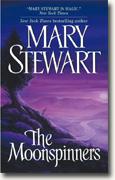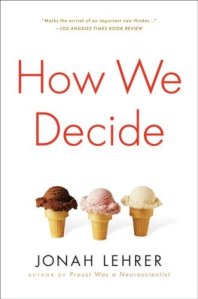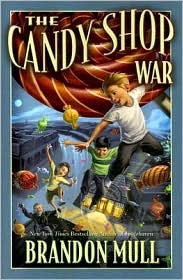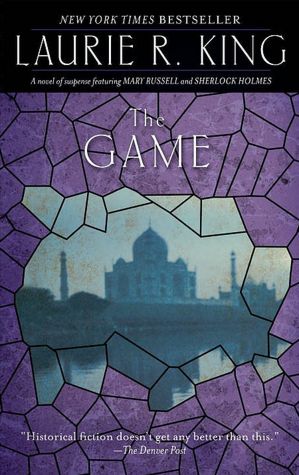I'm skipping around a bit here with the chronology of my reviews, because I wanted to get all of my gushing out in one spot. These three books are all part of the same series. (Also, side note, aren't those covers just gorgeous? I love both styles so much.)
Have I mentioned Mary Russell here before? If I haven't, I apologize, as if you know me in real life and I've spoken to you at all in the past two years there's a 90% chance I've recommended the Mary Russell books to you in terms so strong that you probably backed away slowly, smiling and nodding and looking for something to defend yourself with in case my not-so-latent maniacal tendencies started manifesting themselves in a more sinister way than book recommendations.
Ahem. Mary Russell is one of my current favorite literary characters. Laurie R. King has created an absolutely fantastic series about this British-American Jewish feminist Oxford scholar in the 1910's and 1920's who, at the age of 15, meets up with a retired Sherlock Holmes and becomes his protegee and partner. The books are meticulously researched and just sparkle with wit and intelligence. King's Holmes is his own character but still true to the original vision of Conan Doyle (although this Holmes is rather testy about any references to Conan Doyle; he dislikes the way the latter man sullied his name by association, especially once Conan Doyle turned more to mysticism and fairy stories).
But Mary Russell, from whose viewpoint the stories are told, more than holds her own with Sherlock Holmes without becoming unrealistically superior to him. He still is able to teach and mentor her without making her appear weak. She is a worthy partner for him in every way, and challenges his mind and opinions more than he has been used to.
I've read three of these books this year. The Game is book 7. Later on in the year my book club read book 1, The Beekeeper's Apprentice, and I also read book 8, Locked Rooms.
18. The Game, by Laurie R. King
****
In The Game, Holmes and Russell make their way to India at the request of Mycroft Holmes in order to investigate the disappearance of an intelligence officer by the name of Kimball O'Hara, better known as the titular character of Rudyard Kipling's novel Kim. (One of the delightful things about the Holmes/Russell universe is that many purportedly fictional characters, such as Holmes himself, are actually real and pop up at interesting times.) I loved the atmosphere of this book, which felt simultaneously menacing and full of color and spices. There were a few unexpected but satisfying twists, along with a few threads of a mystery to be picked up in the next book. All in all a solid book and great fun to read, but not quite equal to the top books in the canon (books 5 and 6, O Jerusalem and Justice Hall, were two sides of the same coin and absolute masterpieces. They were two of the top three best books I read in 2011). Four stars.
28. The Beekeeper's Apprentice, by Laurie R. King
*****
It was delightful to re-read The Beekeeper's Apprentice a few weeks later with the benefit of hindsight (or is it foresight when you know what's coming in the next few books? Anyway, I enjoyed it, whatever it was) and seeing how later events in the series were foreshadowed as well as seeing the clues to the answer to the mystery as they popped up in the book. It re-confirmed my conviction that Laurie R. King is a master of storytelling, whose writing style is like weaving a huge epic tapestry: everything is connected, somehow, and all the disparate threads come together to make an astonishing whole. (Yes, I have a serious author crush going on here.) Five stars.
31. Locked Rooms, by Laurie R. King
*****
I went into Locked Rooms not expecting too much, as I'd heard that it was four shorter stories rather than one complete novel. I was delighted to find that I was mistaken. The book is divided into four parts, yes, but that's because two of the parts are actually told using third-person narration with Holmes himself serving as the viewpoint character for the first time in the series, with the other two parts in the accustomed first-person narration of Mary Russell. This may sound like it shouldn't work, but oh, believe me, it does, and is done for very good and sufficient reasons. Far from being disappointed in this book, the ultimate result took my breath away. It stands solidly with books 5 and 6 at the top of the series. This book sees Russell and Holmes arriving in San Francisco to tie up the affairs of Mary's parents' estate, and a mystery from her childhood rises up to confront them. I can't think of anything else to say that won't give away spoilers or just devolve into garbled author-crush gushing. But seriously. Wow. Five stars and mad applause for Laurie R. King. (And yes, this book is a serious contender for the final six-star best book of the year award.)
Seriously, if you haven't started reading this series, do yourself a favor and pick up The Beekeeper's Apprentice. You should read all of them in order so you can properly appreciate the sequence and build of events and facts, and all of them, even the weakest (looking at you, book 3), are solidly on the Books You'll Be Glad You Read list.















